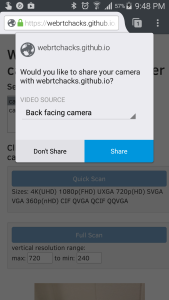Echo cancellation is a cornerstone of the audio experience in WebRTC. Google has invested quite a bit in this area, first with the delay-agnostic echo cancellation in 2015 and now with a new echo cancellation system called AEC3. Debugging issues related to AEC3 is one of the hardest areas. Al Brooks from NewVoiceMedia ran into […]
Chrome
Chrome Screensharing Blues – preparing for getDisplayMedia
The Chrome Webstore has decided to stop allowing inline installation for Chrome extensions. This has quite an impact on WebRTC applications since screensharing in Chrome currently requires an extension. Will the getDisplayMedia API come to the rescue? Screensharing in Chrome When screensharing was introduced in Chrome 33, it required implementation via an extension as a way to […]
So your VPN is leaking because of Chrome’s WebRTC…
We have covered the “WebRTC is leaking your IP address” topic a few times, like when I reported what the NY Times was doing and in my WebRTC-Notifier. Periodically this topic comes up now and again in the blogosphere, generally with great shock and horror. This happened again recently, so here is an updated look into […]
getUserMedia resolutions III – constraints unleashed
Back in October 2013, the relative early days of WebRTC, I set out to get a better understanding of the getUserMedia API and camera constraints in one of my first and most popular posts. I discovered that working with getUserMedia constraints was not all that straight forward. A year later I gave an update after the […]
Surviving Mandatory HTTPS in Chrome (Xander Dumaine)
“Only Secure Origins Are Allowed” – Chrome 47 Chrome 47 now forces secure origins (mostly) with HTTPS. This can be a pain to deal with, but Xander Dumaine is here to help with some guidance. Xander is a Senior Software Engineer who deals with the good and bad of WebRTC for Interactive Intelligence in Raleigh, NC. He is […]




